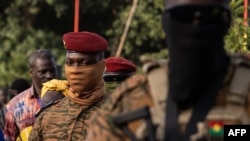The country's military-dominated government has adopted a 188-page document called "Action Plan for Stabilization and Development."
It details a four-pronged strategy comprising: the fight against "terrorism", tackling the country's humanitarian crisis, and, reform of the state and national reconciliation.
The new plan sets down deadlines for progressively restoring security and bringing back state services in jihadist-controlled areas and thus "lower the overall insecurity index."
To achieve this, the plan calls among other things for action to cut off sources of supply for the jihadists.
This would include monitoring of sales of motorbikes, which the Islamists use for hit-and-run attacks, as well as informal money networks.
The plan also calls for efforts to discourage jihadist recruitment of young people, including awareness campaigns about civic duty and their role in "the fight against terrorism."
Burkina Faso has been struggling with a jihadist insurgency that swept in from neighboring Mali in 2015.
Thousands of civilians, troops and police have been killed, more than two million people have fled their homes and around 40 percent of the country lies outside the government's control.
Anger within the military at the mounting toll sparked two coups in 2022, the most recent of which was on September 30, when a 34-year-old captain, Ibrahim Traore, seized power.
He is standing by a pledge made by the preceding junta to stage elections for a civilian government by 2024.
By 2025, half of the country's displaced population will have returned home, the scheme says.








